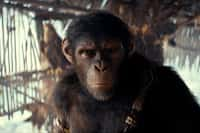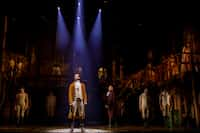As someone who entered adulthood in the '90s (born in 1970), I refuse to believe it's been almost 20 years since they ended. Or that I'm approaching 50. But that's another column. We're here to talk about The Nineties, both the decade and the seven-part CNN series that kicks off July 9.
The first three episodes — about TV of the '90s (a two-parter) and the rise and fall of Bill Clinton — point to some of the decade's rich contradictions. The '90s can be viewed as a cultural breaking away from the Reagan era, with provocative innovations in film, music, TV and politics. But the decade also felt homogenized, bought out and streamlined. The art of commodifying dissent reached new heights (hello, grunge), as did political triangulation (Clinton's 1996 re-election, for which the Comeback Kid cannily staked out a position in the dead center).
Seeing as The Nineties is a TV series, following in the footsteps of The Sixties, The Seventies and, yes, The Eighties, it makes a certain narcissistic sense that the first two installments focus on television. They make a strong case for the decade's transformative impact on the small screen, good, bad and ugly.
You might have trouble remembering, but cable TV wasn't always a haven for long-form dramatic storytelling. The Sopranos didn't enter the arena until 1999, followed three years later by The Wire. Mad Men and Breaking Bad weren't even a glimmer in AMC's eye. More typical of the '90s was Dream On, HBO's tepid sex comedy about the adventures of an adult daydreamer. HBO also had Oz, the pitch-black drama set in an experimental prison facility, which was an outlier in every way and a trailblazer for the shows that followed.
The real noise was being made on the networks. NBC alone introduced Seinfeld, Friends (from Dream On creators David Crane and Marta Kauffman), ER and Homicide: Life on the Street (the precursor to The Wire), among others. ABC pushed network content restrictions into the cable zone with NYPD Blue and brought David Lynch's dream world to the living room with Twin Peaks (now a series on Showtime). Fox launched a postmodern comedy juggernaut in The Simpsons and brought black sketch comedy into the mainstream with In Living Color. The networks were doing some heavy lifting in the '90s, laying the groundwork for the cable renaissance to follow.
And for dessert? Scandal. Lots of it. O.J., Tonya Harding, JonBenét, the Menendez brothers: They all helped cable news stoke the public appetite for dirty deeds. CNN itself feasted on the carnage. Then Fox News came along, just in time for the event that would break the fledgling outlet big: The Monica Lewinsky scandal, a gift from heaven for those eager to take down a president who won some scalding hot hatred along with those two elections. This is where Parts One and Two of The Nineties intersect and where the trend of audience fragmentation accelerated.
Youthful, vigorous, resilient, Bill Clinton seemed like the president of the optimistic future. His campaign theme song, "Don't Stop" (as in thinking about tomorrow), captured the mood. The guy played sax on The Arsenio Hall Show. The economy was booming. He won a second term in 1996 just two years after conservatives took the House in a midterm election rout.
Then, the slow-motion train wreck. All the Whitewater headlines. "I did not have sexual relations with that woman." (Spoiler: He did.) The Starr Report in all its pornographic details (that blue dress). The impeachment trials (the House voted yes, the Senate voted no). All that promise and good will swirling the drain.
The Clinton episode of The Nineties feels a little cursory, like a mad dash through an epic rise and fall. But it manages to conjure some of the decade's Jekyll and Hyde personality. The late, great Haynes Johnson wrote a pair of books on the '90s. One is called The Best of Times. The other is called Divided We Fall. Perhaps the truth lies somewhere in between the agony and the ecstasy, the renewal and the splintering.
Future episodes of The Nineties focus on music, racial strife, terrorism and the rise of the Internet. Together they might form a cohesive picture of those 10 years in recent American history. They might even point out that decades bleed into each other, that the currents of, say, 1988 had a lot in common with those of 1990. We just have a thing for round numbers. They make for convenient book ideas. And TV series.






